Companies on the front line: Trends in overseas Chinese listings
Chinese companies’ annual listings on US stock exchanges have increased tenfold in the past two decades. Their presence in US capital markets has been mutually beneficial for the Chinese and US private sectors: Chinese companies have gained access to the most liquid stock exchanges in the world while Wall Street gains trade revenues.
But geopolitical tensions have destabilized this relationship. Most recently, the United States was on the verge of delisting more than 150 Chinese companies by 2024. In July, it appeared that Beijing was ready to let go of US capital markets but then, in August, China reached a surprising deal with US regulators, promising to give US regulators access to the audit trail of Chinese companies listed in the United States.
Beijing’s sudden willingness to agree to US regulators’ data-sharing demands indicates that delisting more than 150 Chinese companies is a bigger hit than Chinese private sector can take at this time. However, we don’t yet know whether Beijing will follow through on its side of the deal.
The deal could also be a ploy to give Chinese companies time to apply for new primary or secondary listings at home or in Europe. Chinese companies’ recent applications for primary and secondary listings outside the United States do suggest they are preparing for a scenario in which the United States confronts Beijing for failing to deliver on its audit-sharing promises.
US and China: Capital markets connection
Listing in the United States has given Chinese companies access to the world’s largest public capital pool and allowed them to gain international recognition, while exposing them to a more diverse group of investors. But the relationship is far from one-sided. American investors are also eager to invest in Chinese companies.
US stock exchanges have a special appetite for big Chinese company listings, and sometimes go above and beyond to attract them. For example, in 2014, the New York Stock Exchange (NYSE) and Nasdaq OMX Group, Inc. battled over the listing of Alibaba Group Holding Ltd. NYSE went as far as to fly its executives to Hong Kong to make a pitch. Alibaba’s IPO (initial public offering) raised a record $25 billion, by far the largest ever IPO in the United States. Large listings are desirable for stock exchanges because they boost trading revenues more significantly than smaller companies do. Bigger companies trade more and thus provide more exchange fees to the stock exchanges that control their trading.
Meanwhile, large Chinese companies are keen to reduce their exposure to domestic stock exchanges as these are more volatile and prone to heavy-handed government interventions, negatively affecting investors’ confidence in them. For example, the Chinese stock market crashed in 2015 following rapid gains after the Chinese government’s state media-sponsored campaign actively encouraged investment in the market. Eventually, the media blitz-driven bubble burst and the government was forced to intervene by purchasing huge amounts of stock.
Recent escalation of delisting tensions
The mutually beneficial relationship between US stock exchanges and Chinese companies has not been without turbulences. In the past two decades, US regulators have demanded transparency and access to audit papers, while China has consistently denied them full access. Tensions escalated in 2020 when then-President Donald Trump signed into law the Holding Foreign Companies Accountable Act. The Act bans the trading of securities in foreign companies whose audit papers cannot be inspected by US regulators for three years in a row. The Securities and Exchange Commission (SEC) expected that, in 2022, US regulators would flag companies whose 2021 audits were not accessible.
In July 2022 the SEC added Alibaba Group, a Chinese multinational tech company, to the list of Chinese companies at risk of being delisted if they failed to show their audits to US regulators by Spring 2024. Shortly afterwards, five of China’s largest state-owned enterprises—China Life Insurance, PetroChina, China Petroleum & Chemical Corporation, Aluminum Corporation of China, and Sinopec Shanghai Petrochemical—announced plans to delist from the New York Stock Exchange. Chinese officials have stated that the decision was mainly a result of business considerations such as high administrative costs. However, another clear factor is the Chinese government’s lack of willingness to share state-owned companies’ data with US regulators.
On August 26, Chinese and US officials reached an agreement allowing Chinese accounting firms to share more data with US regulators, and potentially preventing the 150 companies from getting delisted in 2024. It turns out China is not ready to lose access to US capital markets after all, and the US is using this leverage to obtain more transparency.
Whether Chinese companies deliver on the promise and give US regulators full access to audit work papers remains to be seen. In 2013, the United States and China negotiated a Memorandum of Understanding for audit oversight but US regulators never gained full access to Chinese public companies’ records. The precedent of not delivering on the promises in the agreement hints that the same scenario is possible again.
In preparation for such an eventuality, Alibaba applied for a primary listing in Hong Kong, regardless of the fact that Hong Kong cannot compete with the depth and liquidity of US capital markets.
Plan B: European stock exchanges
Apart from domestic capital markets, Chinese companies have been eyeing European stock exchanges. Chinese authorities have been working with several European countries to set up programs connecting Chinese and European stock exchanges. For example, in late July, China and Switzerland launched a new China-Swiss Stock Connect program between the SIX Swiss Exchange, and the Shanghai and Shenzhen exchanges. Shortly after launching the program, four Chinese companies operating in energy or manufacturing industries issued global depository receipts on the Swiss stock exchange. While these listings are not initially public offerings, they have opened an avenue for Chinese companies to offer shares in the Swiss capital markets. A dozen more companies have declared their intention to take advantage of the Sino-Swiss Stock Connect program. Thus, European capital markets might become a new destination for Chinese companies.
Conclusion
The recent agreement between the US and Chinese officials on Chinese public companies’ data-sharing indicates that Beijing is not ready to let more than 150 companies become delisted from the US stock exchanges. While the initial delisting of five state-owned companies made it appear that Beijing was ready to allow more delistings from Wall Street, the process might be much slower than expected. For the time being, US-Chinese capital markets interconnectedness still brings more benefits than harm to both countries’ private sectors. Still, Beijing will continue setting up stock connect programs with non-US stock exchanges while Chinese companies will keep applying for primary and secondary listings in China and Europe.
Maia Nikoladze is a Program Assistant with the Economic Statecraft Initiative at the Atlantic Council’s GeoEconomics Center.
Related reading

At the intersection of economics, finance, and foreign policy, the GeoEconomics Center is a translation hub with the goal of helping shape a better global economic future.
Image: Financial rising graph and chart with lines and numbers that illustrate stock market behaviour. Concept of successful trading. Dark blue background. 3d rendering


